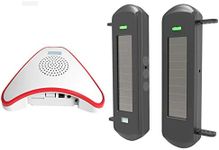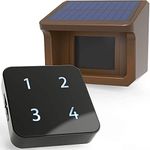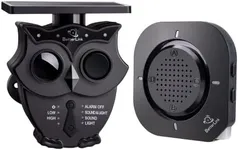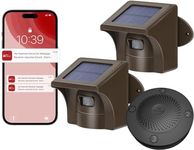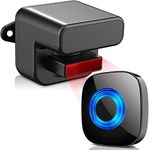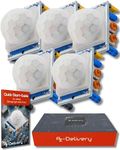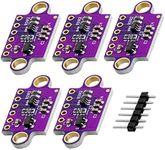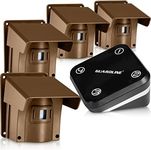Buying Guide for the Best Driveway Alarms
When choosing a driveway alarm, it's important to consider the specific needs of your property and the level of security you desire. Driveway alarms are designed to alert you when someone or something enters your driveway, providing an extra layer of security and peace of mind. To select the best driveway alarm for your needs, you'll want to evaluate various features and specifications that can affect performance and suitability for your particular situation.Detection RangeDetection range refers to the distance over which the driveway alarm can detect movement. This is important because it determines how far away from the sensor an object can be before it triggers the alarm. Detection ranges can vary significantly, from as little as 30 feet to over 1000 feet. If you have a long driveway or want to be alerted well in advance of someone reaching your property, a longer detection range is preferable. Conversely, for shorter driveways or areas where you only need close-range detection, a shorter range may suffice.
Type of SensorDriveway alarms can use different types of sensors, such as infrared, magnetic, or pressure-based sensors. Infrared sensors detect changes in heat, making them suitable for detecting people and animals. Magnetic sensors are ideal for detecting vehicles, as they sense metal. Pressure-based sensors are triggered by weight, which can be useful for detecting vehicles or larger animals. Consider what you primarily want to detect—people, vehicles, or both—and choose a sensor type that aligns with your needs.
Wireless vs. WiredDriveway alarms can be either wireless or wired. Wireless systems are easier to install and offer more flexibility in terms of placement, as they don't require running cables. However, they may be subject to interference and require regular battery changes. Wired systems, on the other hand, are generally more reliable and don't require batteries, but they can be more challenging to install due to the need for running cables. If you prefer a straightforward installation, a wireless system might be best. If reliability and maintenance-free operation are priorities, consider a wired system.
Alert TypeThe alert type refers to how the system notifies you of a detection. Common alert types include audible alarms, visual indicators, or notifications sent to a smartphone or other device. Audible alarms are effective for immediate awareness, while visual indicators can be useful in quieter settings. Smartphone notifications offer convenience and the ability to monitor your driveway remotely. Consider how you want to be alerted and choose a system that offers the alert type that best fits your lifestyle and monitoring preferences.
Weather ResistanceWeather resistance is crucial for outdoor devices like driveway alarms, as they need to withstand various environmental conditions. Look for systems that are rated for weather resistance, often indicated by an IP (Ingress Protection) rating. A higher IP rating means better protection against dust and water. If you live in an area with harsh weather conditions, such as heavy rain or snow, ensure the alarm system is robust enough to handle these elements to ensure long-term reliability.
ExpandabilityExpandability refers to the ability to add more sensors or receivers to your driveway alarm system. This is important if you have a large property or multiple areas you want to monitor. Some systems allow you to connect additional sensors to cover more ground or add extra receivers to ensure you hear alerts throughout your home. If you anticipate needing to expand your system in the future, choose a model that supports additional components.
